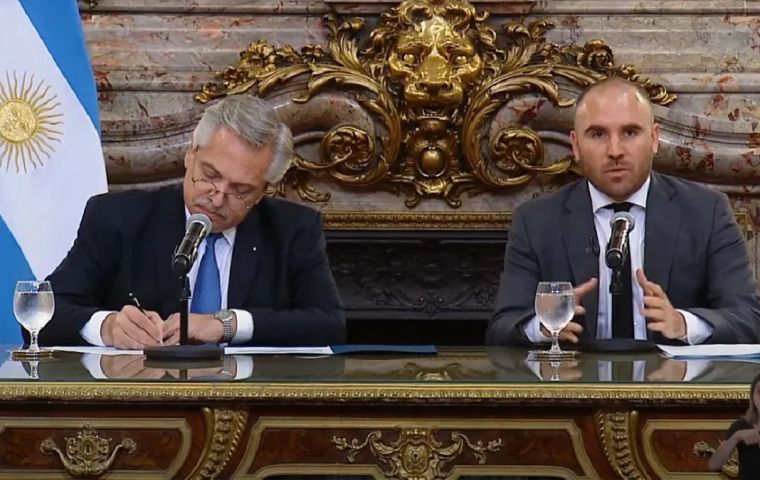MercoPress. South Atlantic News Agency
Argentine Economy Minister resigns, President's fate at stake
 Guzmán's resignation fueled inflation and left President Fernández on the brink of an early departure
Guzmán's resignation fueled inflation and left President Fernández on the brink of an early departure Martín Guzmán has turned in his resignation Saturday as Economy Minister of Argentina, dealing with what many regards as a coup de grace to the administration of President Alberto Fernández, amid rampant inflation and growing popular discontent following additional restrictive measures regarding imports and the purchase of hard currency (namely US dollars) for transactions abroad, where the local peso carries no weight.
As radio analyst María O'Donnell put it on her Twitter account (@odonnellmaria), “It is clear that this is not the kind of crisis that is solved with a change of a minister, now the presidency of Alberto Fernandez is at stake.”
Guzmán too had chosen Twitter (@Martin_M_Guzman) to announce his departure from office. “With the deep conviction and confidence in my vision of the path that Argentina should follow, I will continue working and acting for a more just, free and sovereign homeland,” he wrote while posting images of a long resignation letter to Fernández.
“Since the day [we felt] you could become President... I tried to be your Economy Minister,” Guzmán admitted. He also mentions the remarkable economic recovery of 2021 which included a 10,4 growth in the GDP and a decrease in unemployment from 13.1% in 2020 to 7% in the first quarter of 2022.
“It is very important to note the growth of the country's foreign currency generation... Because if economic growth is not accompanied by the generation of foreign currency, we end up having exchange rate problems that result in contractions of activity, employment and inflationary pressures...,” Guzmán also wrote.
“The reform of the Personal Property Tax, a new Corporate Income Tax scheme and the revision of the export duty rate structure are just some of the milestones of this important task,” he added in his note.
“When a government governs for the welfare of its people, it must do everything possible so that this risk does not end up being paid by the people themselves in the form of draconian adjustments that generate exclusion, unemployment, disinvestment in health, education, infrastructure, science, and thus a country with a worse future, at the expense of maintaining unsustainable financial returns for those who in part took a gamble,” Guzmán also wrote in obvious reference to the administration of former President Mauricio Macri.
“It has been a true honor to accompany you in the task of putting our country back on its feet,” the departing minister also wrote.
”From the experience I have had, I believe it will be essential that whoever replaces me ... has the centralized management of the macroeconomic policy instruments necessary to consolidate the progress described above (...) This will help my successor to carry out the necessary steps towards economic and social progress with the necessary political support...,“ Guzmán pointed out.
According to most analysts in Buenos Aires, by the ”necessary political support“ Guzmán hinted although not in as many words Vice President Cristina Fernández de Kirchner's lack of endorsement towards the candidate she had herself chosen to lead the way to Casa Rosada because she was aware back in 2019 that her name has an electoral ceiling, a political rejection that would make her lose a runoff against Macri.
”I also greatly value your genuine empathy with the people, your unquestionable commitment to improving the quality of life of the people you govern, and your appreciation for transparency. I have learned a lot from you, dear Alberto,” Guzmán insisted.
Following Guzmán's resignation and amid the reigning uncertainty until a successor is announced, the informal exchange rate (cryptodollar) between the US dollar and the Argentine peso jumped from Friday's AR$ 239 / US$ 1 to AR$ 280 / US$ 1, according to Buenos Aires media reports Sunday.
Monday may bring on some sort of truce to financial markets due to the July 4 holiday in the United States. But after paid workers have collected their mid-year bonuses in such a volatile scenario it is quite likely they will turn to the US dollar for some financial security, which will in all likelihood push the exchange rate further up.
Although merely rumors, the main candidates to succeed Guzmán are:
- Lower House Speaker Sergio Massa;
- Economist Cecilia Todesca Bocco, current Secretary of International Economic Relations within the Foreign Ministry, who has also been Deputy Cabinet Chief, both posts under Santiago Cafiero.
- National Institute of Statistics and Census (Indec) Chief Marco Lavagna, also an economist by trade.
-Emmanuel Álvarez Agis, an economist who has been critical of Guzmán and who some outlets Saturday claimed was a done deal.
Regarding Massa's possible appointment and if history is anything to go by, then-President Raúl Alfonsín chose then Lower House Speaker Juan Carlos Pugliese for the position of Economy Minister back on April 4, 1989. His presidency was to end on Dec. 10 that year. He resigned on July 8.
The current inflationary context is somewhat similar to when Pugliese took over: things are getting out of hand. President Fernández needs to reverse the current inflationary drive if he is to keep his job.




Top Comments
Disclaimer & comment rulesCommenting for this story is now closed.
If you have a Facebook account, become a fan and comment on our Facebook Page!